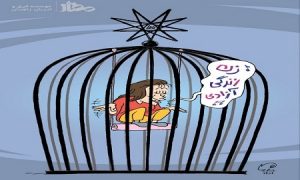Cruelty to women and girls, frustration, depression, crisis in life
The Baha’i girl residing in Zahedan city who was claiming for women’s right during the riots in autumn 1401 S.H. being present in “M” cafe” is now involving in family differences due to the anti-women rules of the deviant cult of Baha’ism. The adventure started when the father of the family died and a house in Daneshgah street, Zahedan city was left after him. Then the elder son of the family claimed for possessing it based on Abdul Baha’s order who has said the house belongs the elder Son. However, the other members of the family particularly girls claimed for dividing it equally among them based on the teaching of the equality between men and women reminding the troubles they have suffered maintaining the father. This issue caused quarrel, argument and anger. The head of the Baha’is of Zahedan city tried hard but he wasn’t successful to reconcile them. Now, the Baha’i girl is both disappointed by the failure of 1401 riots and failed by her father’s inheritance.
The Baha’ism leaders consider themselves the innovators of new teachings including the equality between men and women: “The oneness of women and men is of Bahaullah‘s teachings.[1] Nevertheless, it is interesting to be known that the forged prophet of Baha’ism has assigned the residential house to sons of the deceased person.[2] Also, Abdul Baha has considered the house of the deceased person to belong to the elder son.[3]
[۱] Abbas Effendi, Makatib, Egypt Farajullah Zakiul Kurdi, 1921 A.D., vol. 3, p.107
[۲] Hussein Ali Nouri, the Aqdas, the electronic copy, p.23, paragraph 25
[۳] Ishraq Khawari, the treasury of limitations and commandments, the electronic copy, p. 128






